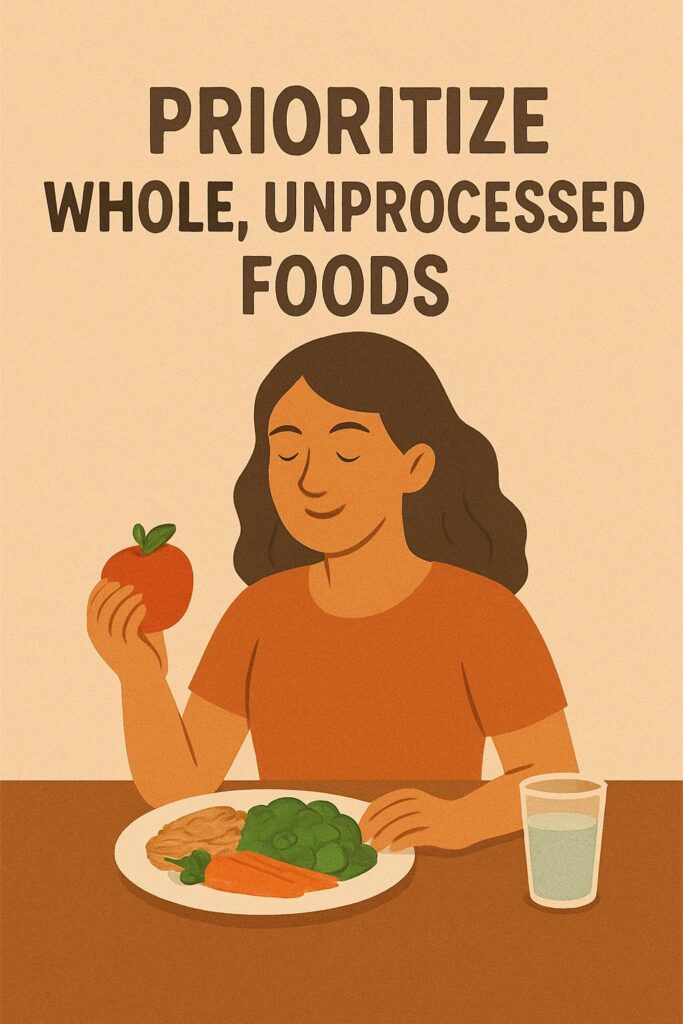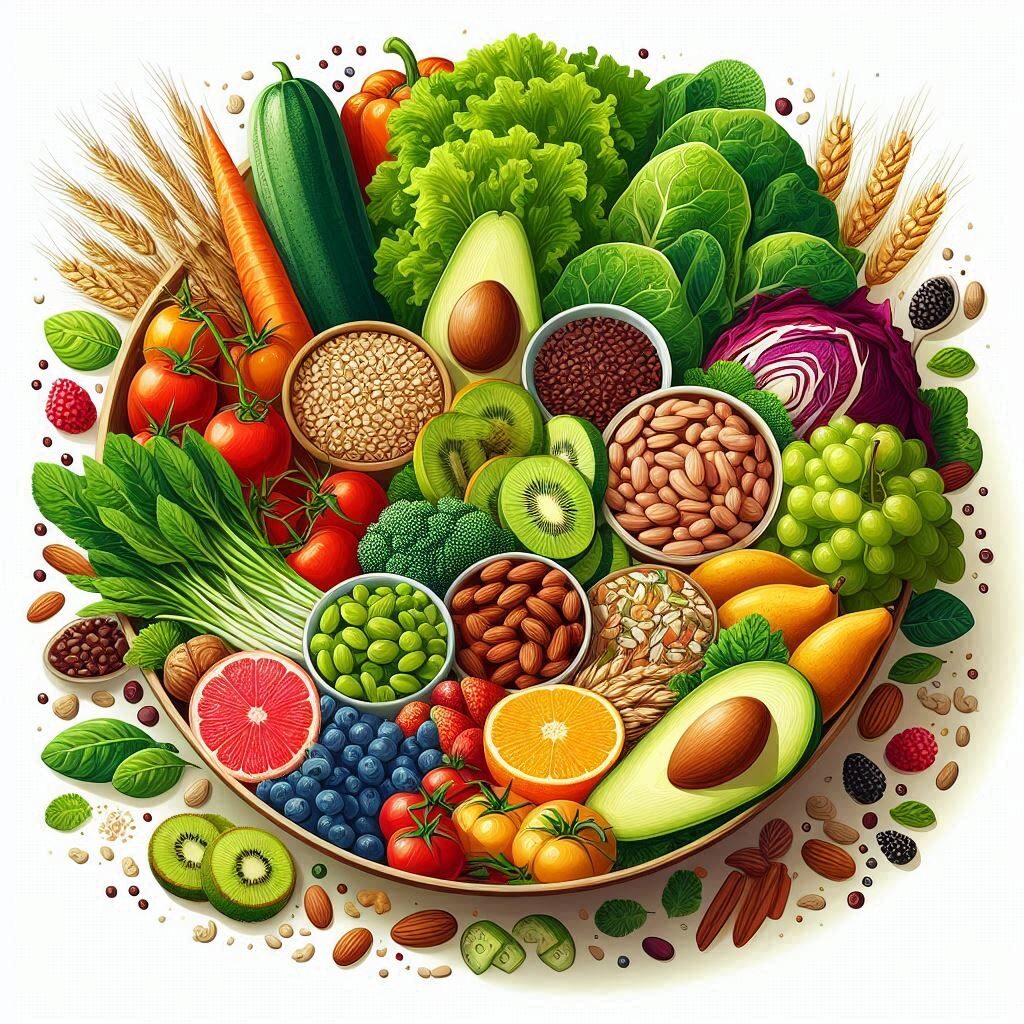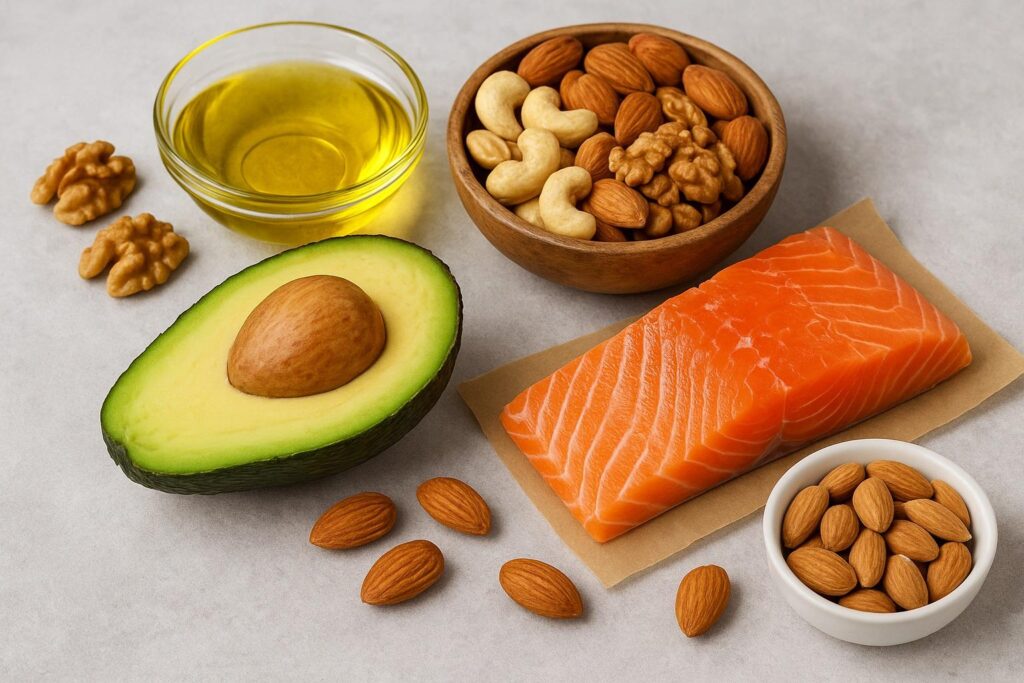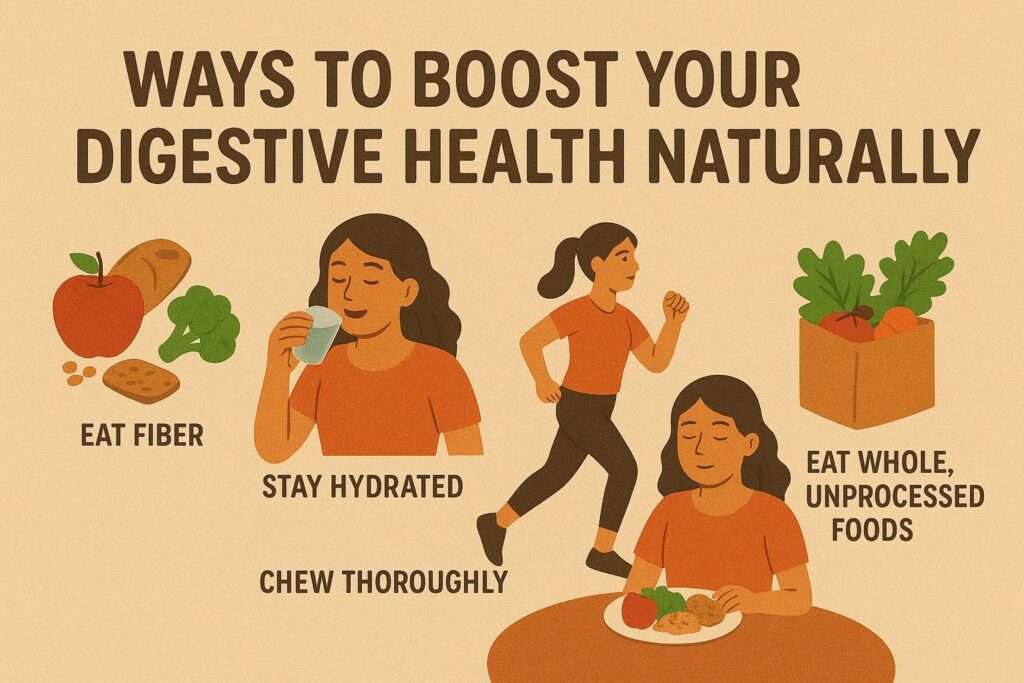Transform your gut health with these evidence-based strategies for optimal digestion and overall wellness
Why Your Digestive Health Matters More Than Ever
Your digestive system is your body’s powerhouse – it’s where nutrients get absorbed, immune cells are trained, and even mood-regulating chemicals are produced. Recent research shows that gut microbiome research has revealed significant implications for current and future health, making digestive wellness a cornerstone of fitness and longevity.
Whether you’re dealing with occasional bloating after meals or chronic digestive discomfort, the good news is that small, consistent changes can lead to dramatic improvements in how you feel every day.
🥗 1. Prioritize Whole, Unprocessed Foods

The Foundation of Digestive Health
Your gut thrives on variety and quality. The typical Western diet – loaded with refined carbohydrates, saturated fats, and artificial additives – has been directly linked to increased digestive disorders and inflammation.
What the Research Shows:
- Food additives like glucose, salt, and chemicals contribute to gut inflammation and “leaky gut” syndrome
- Trans fats increase the risk of ulcerative colitis by up to 34%
- Artificial sweeteners can cause digestive distress in 60-75% of people
Action Steps: ✅ Fill 80% of your plate with whole foods: fresh vegetables, lean proteins, whole grains
✅ Read ingredient labels – avoid foods with more than 5 ingredients
✅ Choose foods that look like they came from nature, not a factory
💡 Fitness Tip: Pack whole food snacks like apple slices with almond butter or homemade trail mix for sustained energy during workouts.
🌾 2. Fuel Up on Fiber (Your Gut’s Best Friend)

The Ultimate Digestive Optimizer
Fiber isn’t just about staying regular – it’s your gut bacteria’s favorite food and your digestive tract’s personal trainer.
The Two Fiber Powerhouses:
- Soluble Fiber: Absorbs water, adds bulk to stool (found in oats, legumes, nuts)
- Insoluble Fiber: Acts like a gentle scrub brush for your intestines (vegetables, whole grains, wheat bran)
Latest Research Highlights: Experts recommend eating 5-10 different plant-based foods daily – including fresh fruits, vegetables, legumes, whole grains, nuts and seeds to promote optimal gut health.
Daily Fiber Goals:
- Women: 25 grams
- Men: 38 grams
- Athletes: Add 5-10 grams for enhanced recovery
🥑 3. Embrace Healthy Fats for Better Absorption
More Than Just Satiety
Quality fats are essential for absorbing fat-soluble vitamins (A, D, E, K) and reducing inflammation throughout your digestive system.

Science-Backed Benefits:
- Omega-3 fatty acids can reduce inflammatory bowel disease risk by up to 30%
- Healthy fats help you feel satisfied longer, preventing overeating
Best Sources: 🐟 Fish: Salmon, mackerel, sardines (2-3x per week)
🌰 Plant-Based: Avocados, walnuts, chia seeds, flaxseeds
🫒 Oils: Extra virgin olive oil, avocado oil (for cooking)
💧 4. Stay Consistently Hydrated
The Simple Solution to Common Digestive Woes
Dehydration is one of the most common yet preventable causes of constipation and sluggish digestion.

Updated Hydration Guidelines:
- Baseline: 50-66 ounces (1.5-2 liters) of non-caffeinated fluids daily
- Active Individuals: Add 12-16 ounces for every hour of exercise
- Hot Climate: Increase by 20-30%
Hydration Hacks: 🥒 Water-rich foods: cucumber, zucchini, watermelon, strawberries
🫖 Herbal teas count toward your fluid intake
💡 Start each day with 16-20 oz of water before coffee
🧘 5. Master Your Stress Response
The Gut-Brain Connection is Real
Chronic stress literally rewires your digestive system, diverting blood flow away from digestion and altering gut bacteria composition.

How Stress Impacts Digestion:
- Reduces digestive enzyme production
- Slows gut transit time
- Increases inflammation
- Disrupts the gut-brain axis
Evidence-Based Stress Management: 🧘♀️ Meditation: Just 10 minutes daily can improve IBS symptoms
🌬️ Deep Breathing: 4-7-8 breathing technique before meals
🏃♂️ Exercise: Regular movement reduces stress hormones by 25%
😴 Sleep: 7-9 hours nightly for optimal gut repair
🍽️ 6. Practice Mindful Eating
Slow Down, Tune In, Digest Better
In our fast-paced world, many digestive issues stem from eating too quickly while distracted. Mindful eating can reduce bloating, gas, and indigestion by up to 40%.
The 5-Step Mindful Eating Method:
- Eliminate distractions – phone away, TV off
- Take three deep breaths before eating
- Chew each bite 20-30 times
- Notice flavors, textures, and aromas
- Put your fork down between bites
💡 Pro Tip: Set a timer for meals – aim for at least 15-20 minutes to eat.
🦷 7. Chew Thoroughly (Digestion Starts Here!)

Your Mouth: The First Step in Optimal Digestion
Poor chewing is linked to decreased nutrient absorption and increased digestive stress. Each chew produces enzymes and saliva that jumpstart the digestive process.
The Chewing Formula:
- Soft foods: 15-20 chews
- Harder foods: 30+ chews
- Nuts/raw vegetables: 40+ chews
Benefits of Proper Chewing: ✅ Increases saliva production (contains digestive enzymes)
✅ Reduces stomach workload by 60%
✅ Improves nutrient absorption
✅ Can reduce stress levels
🚶♀️ 8. Move Your Body, Move Your Gut

Exercise as Digestive Medicine
Regular movement is one of the most effective ways to improve digestion naturally. Exercise helps restore gut microbiota composition and improves host immunity.
Research-Proven Benefits:
- Moderate exercise increases gut transit time by 30%
- 30 minutes of daily walking significantly improves chronic constipation
- Reduces inflammatory compounds throughout the digestive system
Digestive-Boosting Workout Plan: 🚶♀️ Daily: 30-minute walk (especially post-meal)
💪 Strength Training: 3x per week (improves overall gut health)
🧘♀️ Yoga: 2x per week (reduces stress and aids digestion)
👂 9. Listen to Your Body’s Hunger and Fullness Cues
Intuitive Eating for Digestive Wellness
Your body sends clear signals about hunger and satiety – learning to recognize them prevents overeating and digestive discomfort.
The 20-Minute Rule Explained: It takes approximately 20 minutes for satiety hormones to signal fullness to your brain. Eating slowly allows this natural process to work.
Hunger Scale (1-10):
- 1-3: Truly hungry, time to eat
- 4-6: Satisfied, perfect stopping point
- 7-10: Overfull, digestive discomfort likely
🚭 10. Eliminate Digestion-Disrupting Habits
Small Changes, Big Impact
Certain lifestyle habits can undermine even the best dietary efforts.
Smoking 🚭
- Nearly doubles acid reflux risk
- Associated with stomach ulcers and GI cancers
- Quitting improves symptoms within weeks
Excessive Alcohol 🍷
- Increases stomach acid production
- Linked to leaky gut syndrome
- Recommendation: Limit to 1 drink per day (women) or 2 drinks per day (men)
Late-Night Eating 🌙
- Eating within 3 hours of bedtime increases reflux risk by 67%
- Disrupts natural digestive repair processes
- Solution: Finish eating 3-4 hours before sleep
💊 11. Support Your Gut with Targeted Nutrients
The Science-Backed Supplement Stack
While food should be your first source of nutrients, specific supplements can provide additional digestive support.
Probiotics 🦠
Probiotics increase the good bacteria in your gut and are essential for a healthy gut-brain connection.
Key Strains to Look For:
- Lactobacillus acidophilus: Reduces bloating and gas
- Bifidobacterium longum: Supports immune function
- Lactobacillus rhamnosus: Helps with diarrhea and IBS
Food Sources: Yogurt with live cultures, kefir, sauerkraut, kimchi, miso
Glutamine 🥩
An amino acid that repairs intestinal lining and reduces “leaky gut.” Food Sources: Turkey, soybeans, eggs, almonds Supplement Dose: 5-15g daily (consult healthcare provider)
Zinc ⚡
Critical for gut barrier function and immune health. Daily Needs: 8mg (women), 11mg (men) Food Sources: Shellfish, beef, pumpkin seeds, chickpeas
Your 7-Day Digestive Health Kickstart Plan
Week 1 Focus Areas:
Days 1-2: Increase water intake and add one extra serving of fiber daily
Days 3-4: Practice mindful eating for one meal per day
Days 5-6: Add a 15-minute post-meal walk
Day 7: Prepare gut-healthy meals for the upcoming week
Success Metrics to Track:
✅ Energy levels after meals
✅ Bloating frequency and intensity
✅ Bowel movement regularity
✅ Sleep quality
✅ Overall mood and well-being
The Bottom Line: Your Digestive Health Journey
Optimal digestion isn’t about perfection – it’s about consistent, sustainable habits that support your gut microbiome and overall health. Current research emphasizes increasing plant-based protein sources and enhancing alternative proteins with essential nutrients to promote cardiovascular and digestive health.
Start with 2-3 strategies that resonate most with you, master those, then gradually add others. Your digestive system – and your entire body – will thank you.
Remember: Significant digestive symptoms that persist should be evaluated by a healthcare professional. These natural approaches work best as part of a comprehensive health plan.
Ready to transform your digestive health?


